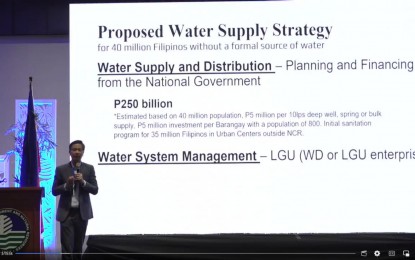
WATER SUMMIT. Department of Environment and Natural Resources Undersecretary Carlos Primo David says about 40 million Filipinos still have no access to formal sources of water during the Waste and Water Summit at SMX Convention Center on Friday (Jan. 26, 2024). To address the problem, he said the government needs to spend about PHP250 billion. (Photo screengrab from DENR Facebook page)
MANILA – About 40 million Filipinos still lack access to formal sources of water, according to the Department of Environment and Natural Resources (DENR).
At the Waste and Water (W2) Summit at SMX Convention Center in Pasay City on Friday, DENR Undersecretary Carlos Primo David said basic water services for every household affect health and have implications on poverty and the sustainability of communities.
“In the NCR (National Capital Region), 99 percent of the population has basic water services. Saan medyo nagkukulang (Where do we lack?)? Region 7, Central Visayas, roughly around 11 percent of the population still requires basic water services, Zamboanga Peninsula, 14 percent of the population are still not connected with basic water services, and Bangsamoro Autonomous Region in Muslim Mindanao (BARMM), 27 percent,” he said.
In terms of water service providers (WSPs), David said that in the NCR, the Metropolitan Waterworks and Sewerage System reported 99 percent coverage that provides potable water to about 20 million Filipinos.
Some 520 water districts give access to about 20 million Filipinos in the provinces, about 535 local government-run WSPs benefit about 20 million Filipinos, and about 10 million individuals have access to clean water through private WSPs.
David said that in April 2023, the DENR was directed by President Ferdinand R. Marcos Jr. to coordinate the entire water sector in the country.
For the past 10 months, he said the DENR had met with all WSPs in the rural areas and urban centers.
Meanwhile, David said the DENR has already outlined its plans under the Sustainable Development Goal (SDG) 6.
He said the most important goal of SDG 6 states that every individual should have access to clean and affordable drinking water; all sectors of society must be educated on the correct usage of water so that more people can have access to it; each household should have proper sanitation facilities; and pollution should be mitigated in waterways, including other possible sources of water, in relation to water and waste management.
In reality, David said water costs are low and affordable compared to electricity, mobile, and communications, or even to internet services.
He said that the national average water rate per household is at PHP300, while in the NCR, the average household spends about PHP500 for water.
The average price per cubic meter of water in the country is PHP22.
However, to be able to provide and supply water to every household, David said the government should spend about PHP250 billion, considering the provision of supply, its distribution, and the infrastructure which also includes the management, operation and maintenance of equipment.
David also emphasized the importance of proper sanitation as many Filipinos still practice open defecation.
“Pinakamatataas na (The biggest) population that still practice open defecation, therefore no proper sanitation services, [in] Region 5-Bicol, eight percent of the population still practice this; Western Visayas, 11 percent; and BARMM, at almost 20 percent of our population, still practice open defecation. Ibig sabihin walang tamang sanitation services sa mga lugar na ito (This means that there are no proper sanitation services in these areas),” he said.
Through the W2 Summit, David hopes that the DENR will be able to partner with the local government units to identify areas and households that do not have water services and be able to provide clean water for every Filipino.
“Ito ang dapat pagtuunan ng pansin (This is what we should focus on), and obviously all the rest of the country will require some form of investment to improve water services and provide basic sanitation services,” he added. (PNA)
